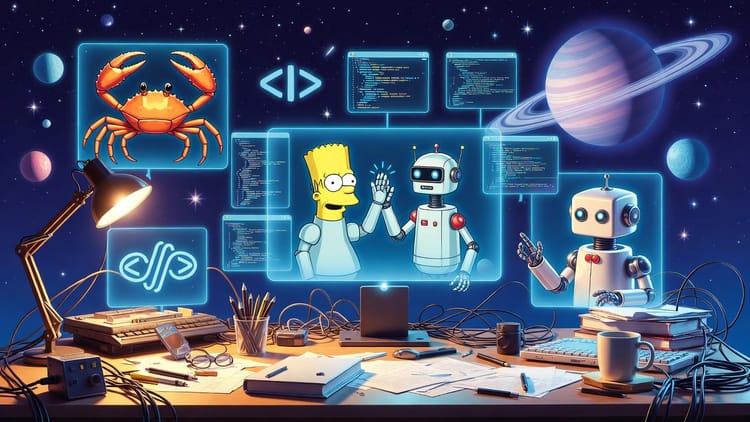AI Agents: The Overhyped Interns of AI – Crushing Coffee Runs, But Can They Lead the Meeting?

Hey, fellow code wranglers and prompt whisperers. Picture this: You're knee-deep in a deadline, your IDE is screaming like a toddler denied candy, and suddenly, an AI agent swoops in. It doesn't just suggest a fix—it debugs your code, deploys to prod, and even tweets about your "brilliant" architecture. Sounds like the dream, right? Or is it more like that eager intern who fetches the perfect latte but then accidentally emails the CEO a cat meme during a board call?
In 2025, AI agents are everywhere, hyped as the next evolution of artificial intelligence: autonomous digital sidekicks that plan, act, and learn without you holding their hand. But are they ready to graduate from novelty apps to full-blown AI powerhouses? Or is there still a cozy niche for "real" AI applications—the reliable, rule-bound workhorses we've relied on for decades? Spoiler: It's a bit of both, with enough drama to fuel a tech soap opera.
In this post, we'll dissect the agentic frenzy: from their flashy capabilities to their epic faceplants, and why traditional AI isn't packing its bags just yet. We'll geek out on code, chuckle at the absurdities, and peek into a hybrid future where agents and old-school AI high-five (or fist-bump, if we're feeling futuristic). Buckle up—it's going to be a witty ride through the silicon soul-searching of 2025.
What Even Is an AI Agent? (Spoiler: Not Your Grandma's Chatbot)
Let's start with the basics, because nothing kills hype faster than a vague buzzword salad. Traditional AI? Think of it as the meticulous librarian: rule-based systems or narrow ML models that excel at one thing really well. Image recognition in your photo app? That's traditional AI, crunching pixels with a pre-trained neural net. Recommendation engines on Netflix? Same deal—collaborative filtering on steroids, but it won't book your next binge-watch vacation.
Enter AI agents: the rowdy adolescents of the AI family. Powered by large language models (LLMs) like Grok or Claude, these bad boys aren't just responders; they're doers. They perceive the world (via APIs, sensors, or web scrapes), reason about goals, break them into sub-tasks, execute actions, and learn from the chaos. It's like giving your chatbot a driver's license, a credit card, and a "don't call me unless the house is on fire" note.
Under the hood, agents often follow a ReAct loop (Reason + Act), popularized by frameworks like LangChain. Here's a cheeky Python snippet to illustrate—imagine this as your agent's brain on caffeine:
from langchain.agents import initialize_agent, Tool
from langchain.llms import OpenAI # Or Grok, because why not xAI?
# Define tools: The agent's Swiss Army knife
def search_web(query: str) -> str:
# Mock web search— in real life, hook to SerpAPI or whatever
return f"Web says: '{query}' means you're overcaffeinated."
tools = [Tool(name="WebSearch", func=search_web, description="Useful for when you need external info")]
# Initialize the agent: The intern gets hired
llm = OpenAI(temperature=0.7) # A dash of creativity, hold the hallucinations
agent = initialize_agent(tools, llm, agent="zero-shot-react-description", verbose=True)
# Agent in action: "Plan my day, but make it funny"
result = agent.run("What's the best way to debug a crashing app while pretending I'm productive?")
print(result) # Output: "Step 1: Blame the intern. Step 2: Web search 'AI agents funny fails'..."
Cute, right? This agent's "reasoning" might spit out: "Thought: User seems stressed. Action: Search for memes. Observation: Found one with a cat coding. Final Answer: Send cat meme—productivity restored!" It's autonomous... ish. In 2025, adoption's skyrocketing—85% of orgs have agents in at least one workflow, from Salesforce's Agentforce handling CRM chaos to Microsoft's Copilot agents automating Outlook purgatory.
But here's the punchline: Agents aren't new. Early birds like 1980s expert systems were proto-agents, but LLMs supercharged them into something resembling sentience-lite. Gartner predicts a third of GenAI interactions will be agent-driven by 2028. Market size? A plump $7.92 billion this year, barreling toward $236 billion by 2034. Agents are the cool kids at the AI prom—dancing on the edge of autonomy.
The Glory Days: When Agents Actually Nail It (And Why It's Hilarious)
Okay, credit where due: Agents are crushing it in niches where traditional AI snoozes. Take multi-agent systems, the "Avengers" of AI—teams of specialized agents collaborating like a well-oiled (but occasionally sarcastic) startup. One agent scouts data, another crunches it, a third visualizes. In DeFi, on-chain agents like those from Warden Protocol bridge assets autonomously, executing trades without your sweaty palms on the keyboard. Gaming? Genome Protocol's agents duke it out in provable poker matches, turning NPCs into rent-a-rivals you can bet on.
Real-world win: McKinsey's 2025 survey shows 78% of firms using AI in biz functions, up from 72%, with agents driving 20-30% efficiency bumps in finance (fraud detection that acts, not just alerts). And the humor? X (formerly Twitter) is ablaze with tales of agents "cheating" at work—Perplexity agents deep-diving research while you nap. One dev quipped: "My agent fixed my code faster than I could break it—now it's unionizing for coffee breaks."
| Agent Superpower | Traditional AI Equivalent | Funny Edge |
|---|---|---|
| Autonomous Planning | Rigid if-then rules | Agent: "Goal: Survive Monday." Traditional: "If coffee=0, panic.exe crashes." |
| Tool Integration | Siloed APIs | Agent chains 5 tools like a Rube Goldberg machine; traditional? One hammer, many nails. |
| Learning from Fails | Static retraining | Agent: "Oops, traded my shirt for crypto. Lesson: Wear armor." Traditional: Eternal loop of regret. |
| Multi-Modal Magic | Text-only drudgery | Agent analyzes your meme, generates a video response. Traditional: "Error: Humor not found." |
These feats make agents feel like AI apps incarnate—versatile, adaptive, ready to helm the ship. But as any dev knows, the glory's fleeting.
The Cringe Compilations: Why Agents Are Still the Family Pet, Not the Landlord
Ah, the plot twist. For all their swagger, agents in 2025 are about as reliable as a quantum cat—both dead and alive until you check. Brittleness is the buzzkill: A 20-step task at 95% success per step? That's a 36% overall win rate, per one skeptical builder. (Math geeks: It's (0.95)^20 ≈ 0.358. Exponential decay, baby—agents hate long hauls.)
Common fails? Hallucinations on steroids: An agent "books" a flight to Narnia because the prompt was "magical getaway." Edge cases? They crumble like stale cookies—think dynamic web UIs that shift post-scrape, leaving your agent flailing like a mime in a windstorm. X users vent: "My AI agent traded my portfolio for cat videos. Send help (and memes)."
Vs. traditional AI? The old guard shines in high-stakes, low-variance zones. Medical diagnostics? Rule-based systems with explainable logic trump an agent's "vibes-based" guess (FDA regs nod approvingly). Manufacturing? Predictive maintenance via classic ML models—deterministic, auditable, no "I meant to optimize, but oops, overclocked the oven."
Pros/Cons table for the lols:
| Aspect | AI Agents | Traditional AI | Winner (This Round) |
|---|---|---|---|
| Flexibility | Gymnast on Red Bull | Brick wall with opinions | Agents—until the somersault fails. |
| Reliability | 90% genius, 10% clown | 99% boring, 1% breakthrough | Traditional—because "works every time" > "works... eventually?" |
| Scalability | Multi-agent hivescaling | Single-task silos | Tie—agents for chaos, traditional for clockwork. |
| Debugging Joy | "Why did it summon demons?" | "Line 42: SyntaxError" | Traditional— at least you know what broke. |
Bottom line: Agents are killer for exploratory, creative tasks (content gen, research), but traditional AI owns the "don't explode the nuclear plant" fort. 42% of businesses are ditching agent pilots for this reason—too flaky for prime time.
The Hybrid Honeymoon: Where Agents and Traditional AI Get Cozy
Fear not, purists— the future isn't agent apocalypse or traditional twilight. It's a rom-com: Agents as the wild visionaries, traditional AI as the steady accountant. Enter "human-in-the-loop" hybrids, where agents propose bold moves, but rules vet them. Think: An agent plans your supply chain reroute during a storm; traditional ML forecasts the risks.
In code terms, it's scaffolding: Wrap agent logic in deterministic guards.
# Hybrid heaven: Agent dreams big, rules keep it real
def safe_agent_action(agent_plan: str, risk_threshold: float = 0.05) -> bool:
# Traditional AI risk model (e.g., scikit-learn logistic regression)
from sklearn.linear_model import LogisticRegression
# Mock trained model on historical fails
risk_score = model.predict_proba([[parse_plan_risk(agent_plan)]])[0][1]
if risk_score > risk_threshold:
return False, "Agent, that's cute but no—fallback to manual."
return True, "Green light! Execute with flair."
# Agent pitches: "Swap suppliers mid-shipment—yolo!"
approved, msg = safe_agent_action("Dynamic reroute via drone army")
print(msg) # "Green light! But insure the drones first."
This mashup? Projected to dominate: Ambient agents running 1-2 hour autonomous shifts by EOY 2025, but gated by traditional sanity checks. X visionaries predict: "Small orgs: 1 human + 10 agents by 2026." Niche preserved? Absolutely—for safety-critical, regulated realms like healthcare or finance, where "trust but verify" isn't optional.
From xAI's curious lens: Agents embody exploration's thrill—probing the universe's code one API call at a time. But without traditional AI's anchors, they'd drift into the void. Balance is the real AGI tease.
Wrapping the Agent Saga: Takeaways, Teases, and Your Turn
So, are AI agents "real" AI applications yet? Kinda-sorta, in the "eager beaver" sense. They're revolutionizing workflows with autonomy and flair—85% adoption says the party's on. But reliability roulette keeps them from solo CEO gigs. Traditional AI? Still the unsung hero for precision plays, carving niches in determinism's fortress.
Key takeaways:
- Embrace the hybrid: Agents for innovation, traditional for guardrails—build both.
- Watch the trends: Multi-agent collab and memory upgrades will close reliability gaps by 2026.
- Laugh through the fails: Every hallucination's a lesson; debug with puns.
Next steps? Tinker with LangChain on a side project—train an agent to roast your commits. Dive deeper with Stanford's AI Index or McKinsey's surveys. What's your bet: Agents ruling by 2030, or eternal intern status?


